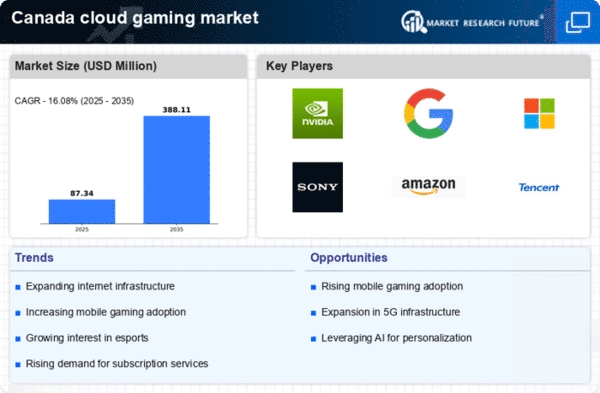Rise of Mobile Gaming
The cloud gaming market in Canada is significantly influenced by the rise of mobile gaming. With the proliferation of smartphones and tablets, an increasing number of Canadians are engaging in gaming on mobile devices. As of 2025, mobile gaming accounts for over 50% of the total gaming revenue in Canada, indicating a shift in consumer preferences. This trend is likely to propel the cloud gaming market, as mobile platforms offer the flexibility to play games anywhere, anytime. Furthermore, advancements in mobile technology, such as 5G networks, enhance the gaming experience by providing faster download speeds and lower latency. Consequently, the cloud gaming market is poised to benefit from this mobile-centric approach, attracting a broader audience and fostering growth in the industry.
Growing Interest in Esports
The cloud gaming market in Canada is positively impacted by the growing interest in esports. As competitive gaming gains popularity, more Canadians are engaging in both playing and watching esports events. This trend is reflected in the increasing viewership numbers, with esports events attracting millions of viewers across various platforms. The cloud gaming market stands to benefit from this surge in interest, as many esports titles are available on cloud platforms, allowing players to participate without the need for high-end gaming hardware. Furthermore, the integration of cloud gaming with esports could enhance accessibility for aspiring gamers, potentially leading to a larger player base. This suggests that the cloud gaming market is likely to thrive as it aligns with the evolving landscape of competitive gaming.
Increased Internet Penetration
The cloud gaming market in Canada is experiencing a notable boost due to the increasing penetration of high-speed internet services. As of 2025, approximately 90% of Canadian households have access to broadband internet, which is crucial for seamless cloud gaming experiences. This widespread availability of fast internet allows gamers to stream high-quality content without significant latency. Moreover, the Canadian government has been actively investing in infrastructure to enhance connectivity in rural areas, further expanding the potential user base. The growth in internet accessibility is likely to drive the cloud gaming market, as more users can engage in gaming without the need for expensive hardware. This trend suggests a promising future for the industry, as it aligns with the growing demand for on-demand gaming solutions.
Diverse Game Library Availability
The cloud gaming market in Canada is bolstered by the increasing availability of diverse game libraries. Major cloud gaming platforms are expanding their offerings, providing access to a wide range of games across various genres. As of 2025, it is estimated that the number of games available on cloud platforms has increased by over 30% compared to previous years. This extensive selection caters to different gaming preferences, attracting a larger audience. Additionally, the ability to play high-quality games without the need for expensive consoles or PCs makes cloud gaming an appealing option for many Canadians. This trend indicates that the cloud gaming market is likely to continue growing, as consumers are drawn to the convenience and variety offered by these platforms.
Shift Towards Digital Distribution
The cloud gaming market in Canada is experiencing a shift towards digital distribution models. As traditional retail sales decline, more consumers are opting for digital purchases and subscriptions. This transition is evident in the increasing number of Canadians who prefer to access games through cloud services rather than physical copies. As of 2025, digital game sales account for approximately 70% of total game sales in Canada. This trend not only reflects changing consumer behavior but also aligns with the convenience offered by cloud gaming platforms. The ability to access a vast library of games without the need for physical storage is likely to drive further growth in the cloud gaming market, as it meets the demands of a tech-savvy audience.

















